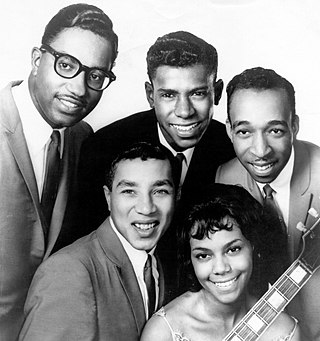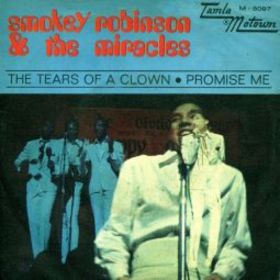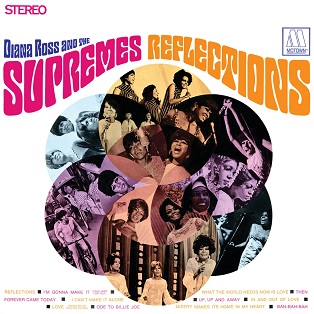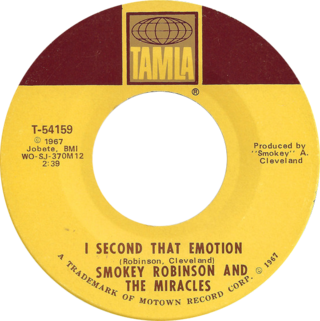
William "Smokey" Robinson Jr. is an American R&B and soul singer, songwriter, record producer, and former record executive. He was the founder and frontman of the pioneering Motown vocal group the Miracles, for which he was also chief songwriter and producer. He led the group from its 1955 origins, when they were called The Five Chimes, until 1972, when he retired from the group to focus on his role as Motown Records vice president. Robinson returned to the music industry as a solo artist the following year. He left Motown in 1999.

Mary Esther Wells was an American singer, who helped to define the emerging sound of Motown in the early 1960s.

The Miracles were an American vocal group formed in Detroit, Michigan in 1955. They were the first successful recording act for Berry Gordy's Motown Records and are considered one of the most important and most influential groups in the history of pop, soul, R&B and rock and roll music. The group's international fame in the 1960s, alongside other Motown acts, led to a greater acceptance of rhythm & blues and pop music in the U.S., with the group being considered influential and important in the development of modern popular music.

"The Tears of a Clown" is a song written by Hank Cosby, Smokey Robinson, and Stevie Wonder and originally recorded by Smokey Robinson & the Miracles for the Tamla Records label subsidiary of Motown, first appearing on the 1967 album Make It Happen. The track was re-released in the United Kingdom as a single in July 1970, and it became a number-one hit on the UK Singles Chart for the week ending September 12, 1970. Subsequently, Motown released a partially re-recorded and completely remixed version as a single in the United States as well, where it quickly became a number-one hit on both the Billboard Hot 100 and R&B Singles charts.

"Shop Around" is a song originally recorded by the Miracles on Motown Records' Tamla subsidiary label. It was written by Miracles lead singer Smokey Robinson and Motown Records founder Berry Gordy. It became a smash hit in 1960 when originally recorded by the Miracles, reaching number one on the Billboard R&B chart, number one on the Cashbox Top 100 Pop Chart, and number two on the Billboard Hot 100 chart. It was the Miracles' first million-selling hit record, and the first-million-selling hit for the Motown Record Corporation.

"Ooo Baby Baby" is a song written by Smokey Robinson and Pete Moore. It was a 1965 hit single by the Miracles for the Tamla (Motown) label.

"The Tracks of My Tears" is a song written by Smokey Robinson, Pete Moore, and Marv Tarplin. It is a multiple award-winning 1965 hit R&B song originally recorded by their group, the Miracles, on Motown's Tamla label. The Miracles' million-selling original version has been inducted into The Grammy Hall of Fame, has been ranked by the Recording Industry Association of America and The National Endowment for the Arts at No. 127 in its list of the "Songs of the Century" – the 365 Greatest Songs of the 20th Century, and has been selected by Rolling Stone as No. 50 on its list of "The 500 Greatest Songs of All Time", among many other awards. In 2021, Rolling Stone ranked the Miracles' original recording of "The Tracks of My Tears" as "The Greatest Motown Song of All Time".

The Temptin' Temptations is the third studio album by The Temptations for the Gordy (Motown) label released in 1965. The album includes several of the group's hits from 1965, and also includes a handful of singles that were not included on the Temptations' first 1965 album, The Temptations Sing Smokey. Among these are the 1964 singles "Girl " and "I'll Be in Trouble"; and the 1965 singles "Since I Lost My Baby", and "My Baby". Seven of the album's 12 tracks had previously been released as singles and their B-sides, though "My Baby" preceded the album only by a month.

Reflections is the twelfth studio album recorded for Motown by Diana Ross & the Supremes. Released in 1968, it was the first regular studio LP to display the new billing of the group formerly known as "The Supremes." It contains the singles "Reflections", "In and Out of Love" and "Forever Came Today". Also included are covers of songs made famous by Martha and the Vandellas and The 5th Dimension. Also present are songs written by other famous names, including "Bah-Bah-Bah" co-written by Motown singer Brenda Holloway with her younger sister, Patrice, an original Smokey Robinson composition titled "Then", and "What the World Needs Now Is Love" by Burt Bacharach and Hal David, which Motown planned to release as a single in the spring of 1968, but cancelled. It also contains a cover of Bobbie Gentry's "Ode to Billie Joe," whose original recording kept the single #2 "Reflections" from peaking at the top spot on the Billboard Hot 100 in September 1967, and it hit #2 on Cashbox.

"I Second That Emotion" is a 1967 song written by Smokey Robinson and Al Cleveland. First charting as a hit for Smokey Robinson and the Miracles on the Tamla/Motown label in 1967, "I Second That Emotion" was later a hit single for the group duet Diana Ross & the Supremes and the Temptations, also on the Motown label.

Meet the Supremes is the debut studio album by The Supremes, released in late 1962 on Motown.
"Doggone Right" is a 1969 single recorded by The Miracles for the Tamla label. Written by Miracles members Smokey Robinson and Marv Tarplin along with Motown staff songwriter Al Cleveland and produced by Robinson, the single peaked at number 32 on the Billboard Hot 100 in the United States. It was also a Top 10 R&B hit, peaking at #7. "Doggone Right" was the A-side to the double-sided Miracles' hit single, Tamla T54183. "Here I Go Again", contrary to popular belief, was the "B" side, although both sides charted within the top 40 of the Hot 100.

"The One Who Really Loves You" is a single recorded by Mary Wells on the Motown label in 1962. It was written and composed by Smokey Robinson of The Miracles and peaked at number eight on the Billboard Hot 100 chart and number two on the Billboard R&B chart.
"(Come 'Round Here) I'm the One You Need" is a 1966 hit single by Motown group The Miracles, released on Motown Records' Tamla label.

"Your Heart Belongs to Me" is a 1962 song written and composed by The Miracles' William "Smokey" Robinson and released as a single by Motown singing group The Supremes during their early years with the label. The song is about a woman whose lover is in the armed forces and has "Gone to a far-away land"; its narration has her tell him to always remember their love for each other if he ever gets lonely.
"When I'm Gone" is a song written by Smokey Robinson and a single he produced twice, one for early Motown star Mary Wells and the other for fellow Motown vocalist Brenda Holloway. Holloway's version became a hit while Wells' was aborted after the singer left the label in 1964.

The One Who Really Loves You is the second album recorded by R&B singer and Motown recording artist Mary Wells, released in 1962 on the Motown label. The album featured the hits, "The One Who Really Loves You" and "You Beat Me to the Punch" and other singles such as the ballads "Strange Love" and "Two Wrongs Don't Make a Right".

Two Lovers and Other Great Hits is an album released by Motown singer Mary Wells, the third album she released while recording for the label. It debuted on the Billboard album chart March 16, 1963 reaching #49, remaining on the chart for eight weeks. The album composed of Wells' third top ten hit, "Two Lovers", the follow-up hit, "Laughing Boy" and the b-side to the "Two Lovers" single, "Operator", the latter song later re-recorded as a minor hit for fellow Motown female crooner, Brenda Holloway.

"I'll Try Something New" is a song written by Smokey Robinson and originally released in 1962 by The Miracles on Motown Records' Tamla subsidiary label. Their version was a Billboard Top 40 hit, peaking at #39, and just missed the Top 10 of its R&B chart, peaking at #11. The song was released later as a joint single by Diana Ross & the Supremes and The Temptations, also becoming a charting version on the Billboard 100 pop singles chart, peaking for two weeks in April 1969 at number 25.
"Bad Girl" is a 1959 doo-wop single by The Miracles. Issued locally on the Motown Records label, it was licensed to and issued nationally by Chess Records because the fledgling Motown Record Corporation did not, at that time, have national distribution. It was the first single released on the Motown label – all previous singles from the company were released on Motown's Tamla label. Although The Miracles had charted regionally and on the R&B charts with several earlier songs, including "Got a Job", "I Cry", "I Need a Change", and "(You Can) Depend on Me", "Bad Girl" was their first national chart hit, reaching #93 on the Billboard Hot 100. Written by Miracles lead singer Smokey Robinson and Motown Records' President and Founder Berry Gordy, "Bad Girl" is a sad, remorseful ballad about a young woman, whom Robinson, as the narrator, says "was so good at the start", but who later in the song "is breaking my heart". It is in the popular doo-wop style, as several of The Miracles' songs were during the late 1950s. The record's success, coupled with the distributor's failure to pay Gordy and The Miracles properly for its sales, prompted Robinson to urge Gordy to "go national" with it, meaning that Motown should do its own national distribution of its songs, and eliminate the middleman, to ensure that all money from sales of its records would go directly to the label.